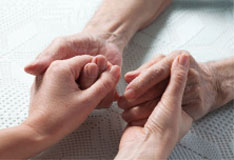An anchor for getting them through

Our patient Mr. Girish Pawar, who was 60 years of age, came to PALCARE in the month of July, 2019. He lived with his wife and younger daughter, while the older daughter lived in the USA. When the PALCARE team first visited the patient, the wife recounted the patient’s clinical history and she came across as being strong and confident. The patient, on the other hand, sat quietly next to her listening intently to every detail.
Mr. Girish was diagnosed with CA stomach. His stomach had been removed completely and he was on a TPN drip round the clock. He had continuous oral secretions, a cough and nausea. He was also experiencing difficulty in sleeping, speaking, walking and sitting for long durations, leading to him being pretty frustrated most of the time. He was irritated because of the continuous oral secretions as it resulted in difficulty in sleeping and speaking. The patient had lost at least 20 kgs and had become weak and frail.
 While
the doctor and nurses examined Mr. Girish, the psychologist spoke with the
patient’s wife and daughter in private, at which point the wife shed her strong
exterior and broke down, expressing how difficult it is to see her husband in
this condition and how quickly his health had deteriorated to this level. She
expressed a feeling of great helplessness when her husband wants to eat and
taste his food but sadly cannot because he has no stomach.
While
the doctor and nurses examined Mr. Girish, the psychologist spoke with the
patient’s wife and daughter in private, at which point the wife shed her strong
exterior and broke down, expressing how difficult it is to see her husband in
this condition and how quickly his health had deteriorated to this level. She
expressed a feeling of great helplessness when her husband wants to eat and
taste his food but sadly cannot because he has no stomach.
It was then that PALCARE realised that, along with help for relief of the physical symptoms of the patient, the family also needed psychological support; and the psychologist offered as much emotional support and help that they required. Questions in relation to the prognosis and management of the symptoms, in addition to coping strategies and dealing with loss were discussed and the family was supported throughout. The wife and daughter seemed pleased that their concerns were being addressed and felt that they were not alone in this journey.
The doctor and nurses, on the other hand, ensured that a protocol for the medication was set and so that his physical symptoms could be quickly brought under control. In a span of two weeks, the symptoms were managed to a satisfactory level and the patient experienced relief, and this also had a direct effect on his mood.
 It was also during this time that the psychologist
conducted a joint session with the family where everyone openly shared their
emotions and the manner in which they had been coping with the same. The wife
and the daughters were still struggling to come to terms with the prognosis of
the illness and expressed that they felt helpless, angry and frustrated in the
situation. However, it was evident that the counselling sessions gave them an
opportunity to vent these emotions and simultaneously, with logic and reasoning,
get in touch with their feelings. These sessions proved to be an anchor for them
and the family looked forward for the Psychologist to conduct the sessions.
It was also during this time that the psychologist
conducted a joint session with the family where everyone openly shared their
emotions and the manner in which they had been coping with the same. The wife
and the daughters were still struggling to come to terms with the prognosis of
the illness and expressed that they felt helpless, angry and frustrated in the
situation. However, it was evident that the counselling sessions gave them an
opportunity to vent these emotions and simultaneously, with logic and reasoning,
get in touch with their feelings. These sessions proved to be an anchor for them
and the family looked forward for the Psychologist to conduct the sessions.
The family was thoroughly supported by PALCARE through the difficult times. As the condition of the patient deteriorated and he passed away, the family was in severe distress as they experienced the loss of their loved one. However, the family had been explained by the PALCARE team that the end was near, and this had helped them cope better. The PALCARE team is still in touch with the patient’s wife and daughters, getting regular updates about their wellbeing and supporting them in times of distress.
*Patients’ names, on this and following pages, have been changed to protect their identity.

